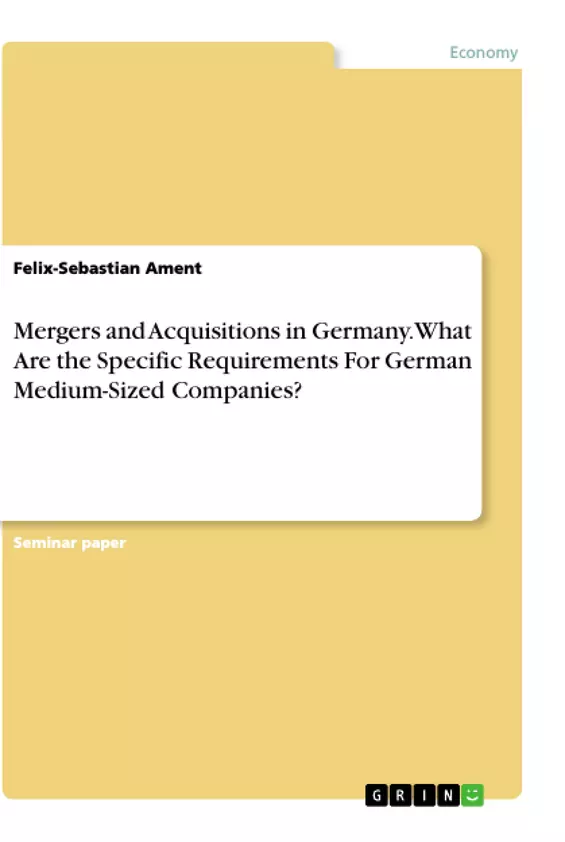The aim of this thesis is to examine the transaction environment for medium-sized German companies and to question the motives and obstacles for transactions at medium-sized companies. Derived from this, the reader is to be shown the special features of medium-sized merger and acquisition transactions. In the first part of the thesis, a theoretical basis is formed, which first presents the standard process of such a transaction to the reader.
Digitization and globalization are increasingly forcing German SMEs to compete with foreign companies. New large growth markets outside Germany require an adjustment of the internationalization strategy. To remain competitive, companies must expand existing networks and merge into new networks. Specialize and, if necessary, reduce offers. Increase cost efficiency, optimize and modernize processes and expand production capacities. Furthermore, expand and consolidate the international presence.
One opportunity to implement these strategies is the implementation of Mergers & Acquisitions. This term is used to describe a merger or fusion of two companies to form a legal and economic unit or the acquisition of company units or an entire company. "M&A stands for all transactions in connection with the transfer and encumbrance of property rights in companies, including the formation of groups of companies, the restructuring of groups of companies, mergers and transformations in the legal sense, squeeze-outs, the financing of the acquisition of companies, the formation of joint ventures and the takeover of companies."
M&A transactions can be achieved through economies of scale and economies of scope by in-creasing activity within the company. In addition, new internal success potentials can be developed and core capabilities can be better utilized. Furthermore, the scope for pricing and negotiation can be increased, thus enhancing market power.
Inhaltsverzeichnis (Table of Contents)
- Introduction
- Research questions and reflection
- The aim of the work
- Structure and methodology
- Basics of Mergers & Acquisitions
- M&A in medium-sized companies
- M&A Consulting
- Financial services in M&A
- M&A requirements of medium-sized companies
- Summary and outlook
Zielsetzung und Themenschwerpunkte (Objectives and Key Themes)
This research paper aims to analyze the specific requirements for Merger & Acquisition transactions in German medium-sized companies. The study explores the key considerations and challenges faced by businesses during M&A processes, shedding light on the role of financial services and consulting in facilitating successful mergers and acquisitions.
- M&A in German medium-sized companies
- Financial services in M&A
- Requirements for successful M&A transactions
- The role of consulting in M&A
- Challenges and considerations in M&A processes
Zusammenfassung der Kapitel (Chapter Summaries)
The paper begins by outlining the research questions and methodology employed in the study. It then provides a fundamental understanding of Mergers & Acquisitions, including key definitions and concepts.
The subsequent chapters delve into the specificities of M&A in medium-sized companies, highlighting the role of M&A consulting and financial services in supporting these transactions.
The paper concludes with an analysis of the requirements for successful M&A transactions in German medium-sized companies, examining key factors influencing their success.
Schlüsselwörter (Keywords)
Mergers & Acquisitions (M&A), Medium-sized companies (SME), Financial services, M&A consulting, German M&A market, Post-Merger Integration (PMI).
Frequently Asked Questions
What does M&A stand for?
M&A stands for Mergers and Acquisitions, which refers to the consolidation of companies or assets through various types of financial transactions.
Why are German medium-sized companies (SMEs) increasingly engaging in M&A?
SMEs use M&A to remain competitive against global players, adjust to digitization, expand into international growth markets, and increase cost efficiency.
What are "economies of scale" in the context of M&A?
Economies of scale refer to the cost advantages that a company gains due to its size, such as lower per-unit costs achieved by increasing production after a merger.
What is the role of M&A consulting for SMEs?
M&A consultants help medium-sized companies navigate the complex process of a transaction, from identifying potential targets to financial valuation and negotiation.
What is Post-Merger Integration (PMI)?
PMI is the process of combining and rearranging businesses after an acquisition to realize the projected synergies and ensure a smooth transition into a single economic unit.
What are the main obstacles for M&A in medium-sized firms?
Common obstacles include cultural differences between companies, integration challenges, financial risks, and the need for specialized strategic planning.
- Citation du texte
- Felix-Sebastian Ament (Auteur), 2020, Mergers and Acquisitions in Germany. What Are the Specific Requirements For German Medium-Sized Companies?, Munich, GRIN Verlag, https://www.grin.com/document/916287



